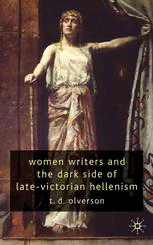
Women Writers and the Dark Side of Late-Victorian Hellenism PDF
Preview Women Writers and the Dark Side of Late-Victorian Hellenism
Women Writers and the DarkSide of Late-VictorianHellenism This page intentionally left blank Women Writers and the Dark Side of Late-Victorian Hellenism T. D. Olverson palgrave macmillan ©T.D.Olverson2010 Softcover reprint of the hardcover 1st edition 2010 978-0-230-21559-7 Allrightsreserved.Noreproduction,copyortransmissionofthis publicationmaybemadewithoutwrittenpermission. Noportionofthispublicationmaybereproduced,copiedortransmitted savewithwrittenpermissionorinaccordancewiththeprovisionsofthe Copyright,DesignsandPatentsAct1988,orunderthetermsofanylicence permittinglimitedcopyingissuedbytheCopyrightLicensingAgency, SaffronHouse,6-10KirbyStreet,LondonEC1N8TS. Anypersonwhodoesanyunauthorizedactinrelationtothispublication maybeliabletocriminalprosecutionandcivilclaimsfordamages. Theauthorhasassertedherrighttobeidentified astheauthorofthisworkinaccordancewiththeCopyright, DesignsandPatentsAct1988. Firstpublished2010by PALGRAVEMACMILLAN PalgraveMacmillanintheUKisanimprintofMacmillanPublishersLimited, registeredinEngland,companynumber785998,ofHoundmills,Basingstoke, HampshireRG216XS. PalgraveMacmillanintheUSisadivisionofStMartin’sPressLLC, 175FifthAvenue,NewYork,NY10010. PalgraveMacmillanistheglobalacademicimprintoftheabovecompanies andhascompaniesandrepresentativesthroughouttheworld. Palgrave®andMacmillan®areregisteredtrademarksintheUnitedStates, theUnitedKingdom,Europeandothercountries. ISBN 978-1-349-30342-7 ISBN 978-0-230-24680-5 (eBook) DOI 10.1057/9780230246805 Thisbookisprintedonpapersuitableforrecyclingandmadefromfully managedandsustainedforestsources.Logging,pulpingandmanufacturing processesareexpectedtoconformtotheenvironmentalregulationsofthe countryoforigin. AcataloguerecordforthisbookisavailablefromtheBritishLibrary. AcatalogrecordforthisbookisavailablefromtheLibraryofCongress. 10 9 8 7 6 5 4 3 2 1 19 18 17 16 15 14 13 12 11 10 Contents Acknowledgements vii Introduction:ContestedGround:GenderandVictorian Hellenism(s) 1 Thedemosandtheclassics 6 TheshininglightofGreekculture 8 The‘trickofGreek’:women’saccesstotheclassics 10 DaughtersofDionysus 18 1 TakingontheTradition:AugustaWebster’sFeminist Revisionism 27 Ofmaidens,magicandmurder:Webster’s‘Circe’and‘Medea inAthens’ 32 ‘AmInohappywife?’:Webster’s‘MedeainAthens’ 33 Herownmistress:Webster’s‘Circe’ 45 2 AmyLevy’sGreek(Anti-)Heroines 54 ‘Hertenderlanguagewhollymisconceived’:AmyLevy’s Xantippe 57 Hellenismandanarchy:Levy’sMedea 69 3 WorldswithoutWomen:EmilyPfeiffer’sPolitical Hellenism 83 EmilyPfeiffer’s‘StudiesfromtheAntique’ 85 Makingsilencespeak:Kassandra’sburningwords 91 ‘Powertowreakhighruin’:femalemilitancyandPfeiffer’s ‘Klytemnestra’ 100 4 OldGreekWineinNewBottles:MichaelField’sDionysiac Poetics 111 MichaelField’seroticpoetics 116 Themiss-educationofMichaelField 118 LibidinouslaureatesandlyricalMaenads:MichaelField, SwinburneandthesexualpoliticsoferoticHellenism 123 ‘Iamamaenad,Imusthavelove’swine’:MichaelField’s Callirrhoë 127 v vi Contents 5 Medea’sHauntingoftheFin-de-Siècle 145 Thespiritofrebellion:MonaCaird’sDaughtersofDanaus 148 Medea’safterlifeinVernonLee’s‘AmourDure’ 157 Afterword:LookingBackWithanEyetotheFuture 171 Notes 175 Bibliography 206 Index 231 Acknowledgements This book developed over several years with the support of many friends andcolleagues.IowemygratitudetoLindaR.Anderson,whosesupporthas helpedtoseethisprojectthroughtoitsconclusion.Iwouldalsoliketothank HilaryFraserforhergenerousencouragementandintellectualexample,and JohnBatchelor,NaomiHetherington,LindaBeckmanandKathleenHickok for their helpful advice. I am also grateful to the anonymous reader from Palgrave,whoseusefulcommentshavehelpedtoshapethisstudyandrefine myideas. My sincere thanks to all the staff at the Robinson Library, Newcas- tle. I would also like to extend my gratitude to Mrs Basil Herbertson for permission to reference her husband’s article, to the staff of Cambridge UniversityLibrary,theBritishLibrary,JohnRylandsLibrary,SpecialCollec- tions staff at Leeds University Library, Colin Harris of the Bodleian Library, Anne Thomson of Newnham College Library, administrators and staff at the Camellia Collection,Kent, and Special Collections staff at the National LibraryofScotland. I’dliketothankPaulaKennedyandStevenHallatPalgravefortheirenthu- siasticsupportforthisproject.Mywarmestthanksareduetomyfamilyand friendsforalltheirencouragementoverthislongperiodoftime,particularly myfatherPhillipandmymotherElaine.Finally,Iwouldliketodedicatethis bookbothtothememoryofmygrandmother,AudreyTerry,andtoLouise A.Armstrong.Withoutyourunconditionalloveandsupportthewritingof thisbookwouldnothavebeenpossible–thankyou,foreverything. vii Introduction: Contested Ground: Gender and Victorian Hellenism(s) The ancient classics resemble the universe. They are always there, and they are very much the same as ever. But as the philosophy of every new age puts a fresh construction on the universe, so in the classics scholarship finds a perennial object for ever fresh and originalinterpretation.1 Myths by reason of their symbolic pregnancy and spontaneity of origin,areeverlastinglyelastic.2 Re-vision – the act of looking back, of seeing with fresh eyes, of entering an old text from a new critical direction – is for women morethanachapterinculturalhistory:itisanactofsurvival.3 ‘IthankgodIwasbornahumanandnotananimal,amanandnot awoman,aGreekandnotabarbarian’–Socrates WhatwenowthinkofastheHellenicinheritancewithinBritishculturewas a Victorian invention. After the first wave of artists and explorers returned from Greece in the eighteenth century, Greek culture became, as Richard Jenkyns suggests, ‘à la mode; art, archaeology, history and philology would haveanucleusaroundwhichtheycouldgather,eachstimulatinginterestin theothers’.4IftheRomanticsrediscoveredthehistoricalsignificanceandthe artistic potential of the ancient Greeks, it was the Victorians who adopted Hellenism as an integral part of British culture.5 Dwight Culler notes that, ‘it was clearly a habit of mind among the Victorians to perceive analogies between their own day and various historical epochs in the past and then tousetheseanalogiesinconductingtheircontroversies’.6 Bythelatenine- teenth century, the period on which this study is focused, ‘ancient Greece’ constitutedavarietyofcompetingdiscourses.7Indeed,accordingtoBernard Knox, ‘the Victorians appropriated the ancient Greeks, imagined them as contemporaries,andusedtheirwritingsasweaponsintheirownideological 1 2 WomenWritersandtheDarkSideofLate-VictorianHellenism wars’.8 Like the troubled ‘nation’ of Greece, nineteenth-century Hellenism wasideologicallyimportantbutfraughtwithtensionandconflict. HilaryFrasersuggeststhat,‘Victoriancommentatorswereacutelyawareof thevarietiesofclassicismandmedievalismdisplayedamongcontemporary poets.’9 One of the aims of this study is, therefore, to amplify the various networks of interests at play within Victorian Hellenism(s). Of the numer- ousdiscourseswhichHellenismintersectsinthenineteenthcentury,oneof themostsignificantisthatofsexualpolitics.InthefollowingpagesIintend torevealtheextenttowhichHellenisminfluencedVictorianconceptionsof gender and sexuality in the work of women writers. That is not to say that gender-related issues are the only subjects of concern. Wider issues of edu- cation,racism,spirituality,personalfreedomanddemocracyalltraversethe appropriationofHellenicsubjectsbywomenwriters.Moreover,womendid notwriteorgeneratetheirworkfromwithinavacuum;theywereinfluenced bytheworkandopinionsoftheirmalecontemporaries.Mappingtheinflu- enceofHellenismoverBritishwomenwritersis,therefore,aconvolutedand multifarioustask. It may seem that the Greeks have always shone a light, or cast a long shadowoverBritishculture,butitwasnotalwaysso.Intheearlyeighteenth centuryitwasLatinandthegloriesoftheRomanEmpirethatwererevered as markers of English high culture. In looking back, the Victorians (inap- propriately) labelled the eighteenth century England’s ‘Augustan Age’.10 As Cullerobserves,fromthesixteenthtotheeighteenthcenturiesinEngland, thewordsGreekandGreciancarriedunfavourableconnotations.Manyaristo- cratic(anti-democratic)leadersinfactpreferredtheancientregimeofSparta tothatofancientAthens.Athenswasconsideredtobe‘wanton,too“merry,” andgiventopederasty’.11But,followingtheexcavationsatPompeiiin1748 and the publication of James Stuart and Nicholas Revett’s extraordinary drawings of the Greek mainland and its architectural treasures, interest in thecivilizationofancientGreecewasrevived.12 On the continent, Johann Winckelmann, Jean Jacques Barthélèmy and August Wilhelm Schlegel, amongst others, also aroused new interest and generated great debate about the lives of the ancient Greeks through their ownliteraryandartisticinterpretations.Butwhatismostinterestingabout this sudden avalanche of critical interest is that at this time, as Jennifer Wallace reminds us, ‘the official account of Greece did not yet exist, with theresultthatthesewriterswerestillabletodisputeandreshapetheirideas’. Furthermore,‘thesenewideasofGreecewereseenaspioneeringandradical, emanatingfromoutsidethestandardculturalexpectationsandinstitutional values’.13 Hellenism was, at this point, a relatively fluid set of images and ideas,underdebateandunderconstruction. Bythemiddleofthenineteenthcentury,manyVictoriansfeltacloseaffin- ity with the glorious achievements of ancient Greece and Rome. For the agentsandsupportersofEngland’sburgeoningEmpire,thepolitical,military
